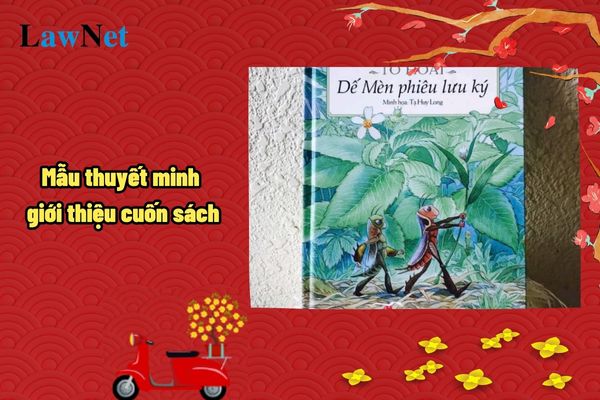What is the sample explanatory essay on introducing a favorite book for 8th-grade students in Vietnam? What are the 06 rights of lower secondary school students in Vietnam?
What is the sample explanatory essay on introducing a favorite book for 8th-grade students in Vietnam?
Students can refer to the following sample explanatory essay on introducing a favorite book in Vietnam:
|
Sample explanatory essay on introducing a favorite book for 8th-grade students "Dế Mèn phiêu lưu ký" by the author To Hoai is a book that has accompanied countless generations of Vietnamese readers. The story tells about the life of De Men, a strong but arrogant and stubborn young cricket. Through interesting adventures, De Men learns valuable life lessons. |
*Note: Information is for reference only./.

What is the sample explanatory essay on introducing a favorite book for 8th-grade students in Vietnam? What are the 06 rights of lower secondary school students in Vietnam? (Image from the Internet)
What are the 06 rights of lower secondary school students in Vietnam?
According to Article 35 of the lower secondary school, upper secondary school and multi-level school charter issued by the Ministry of Education and Training together with Circular 32/2020/TT-BGDDT, lower secondary school students in Vietnam have rights as follows:
1. Receive comprehensive education with fairness, be provided with time, facilities, hygiene and safety to learn in class and self-learn at home, be informed of their education and training, and be able to use learning, cultural and sport equipment of their schools as per the law.
2. Receive respect, protection and fair and democratic treatment, complain to their schools and education authorities about decisions concerning themselves; transfer school with legitimate reason as per existing regulations; enter school before the compulsory starting age, skip a grade and study at an age higher than the compulsory attendance age according to regulations in Article 33 of Circular 32/2020/TT-BGDDT.
3. Participate in activities for development of their gifts in academic subjects, sports and art organized by their schools if able to.
4. Students eligible for social benefits, disadvantaged students and gifted students may receive sponsorship or other benefits as per the law.
5. Transfer school if eligible according to regulations following school transfer procedures stipulated by the Minister of Education and Training.
6. Enjoy other rights as per the law.
What is the relationship among the lower secondary school, the family and the society?
Under Article 45 of the lower secondary school, upper secondary school and multi-level school charter issued by the Ministry of Education and Training together with Circular 32/2020/TT-BGDDT, the relationship among the lower secondary school, the family and the society is prescribed as follows:
- The school shall proactively, regularly and closely cooperate with the family and the society in building a unified learning environment to achieve educational objectives and apply educational principles.
- The school shall cooperate with the local government and mass organizations, parent committees and relevant socio-political organizations and individuals in:
+ Finalize educating methods, contents and viewpoints between the school, the family and the society to achieve educational objectives.
+ Mobilize forces and resources of the community for education and educational equipment and facilities for the school; develop learning movements and build a healthy and safe learning environment; prevent bad influence on students; and enable students to play and participate in healthy and age-appropriate cultural and sport activities.

